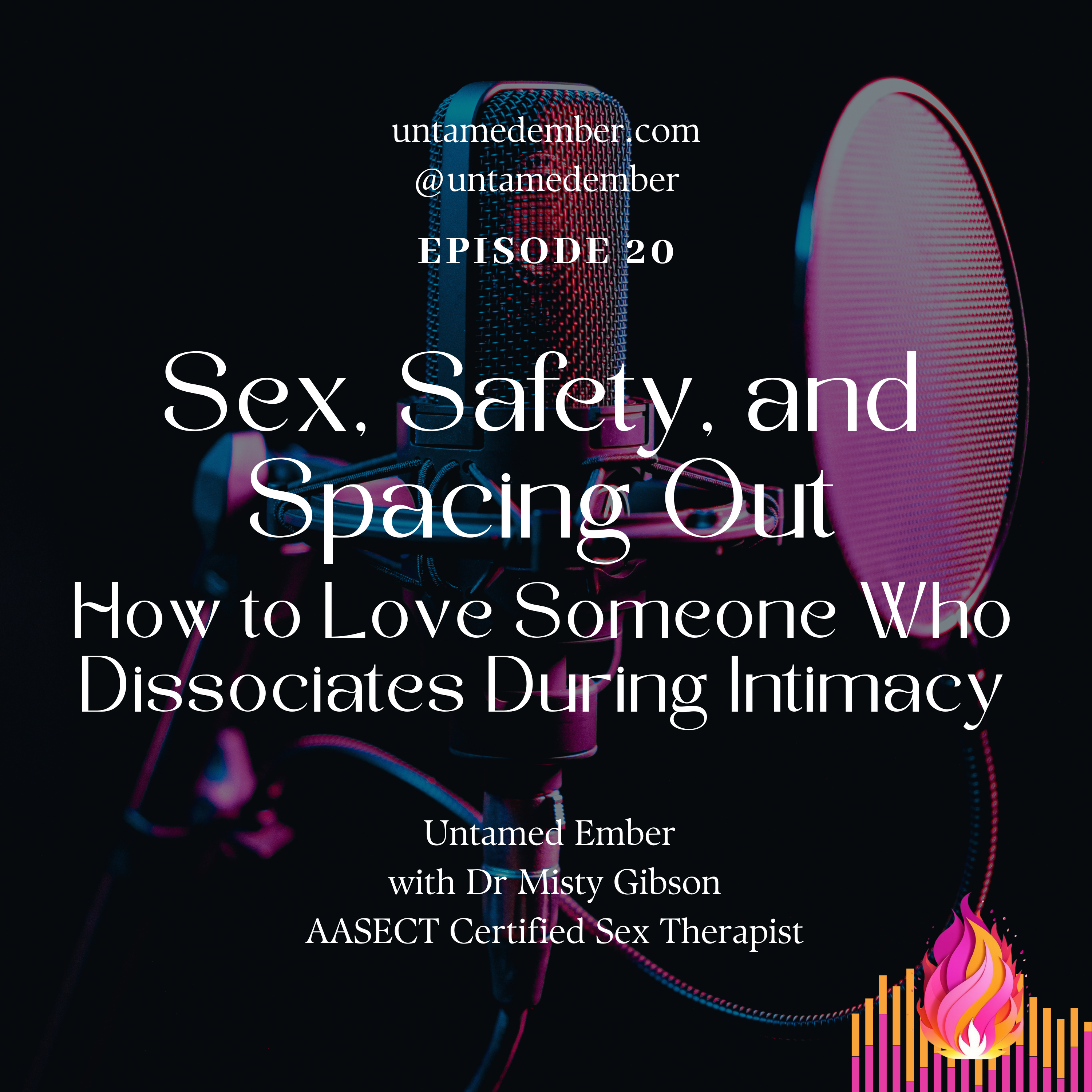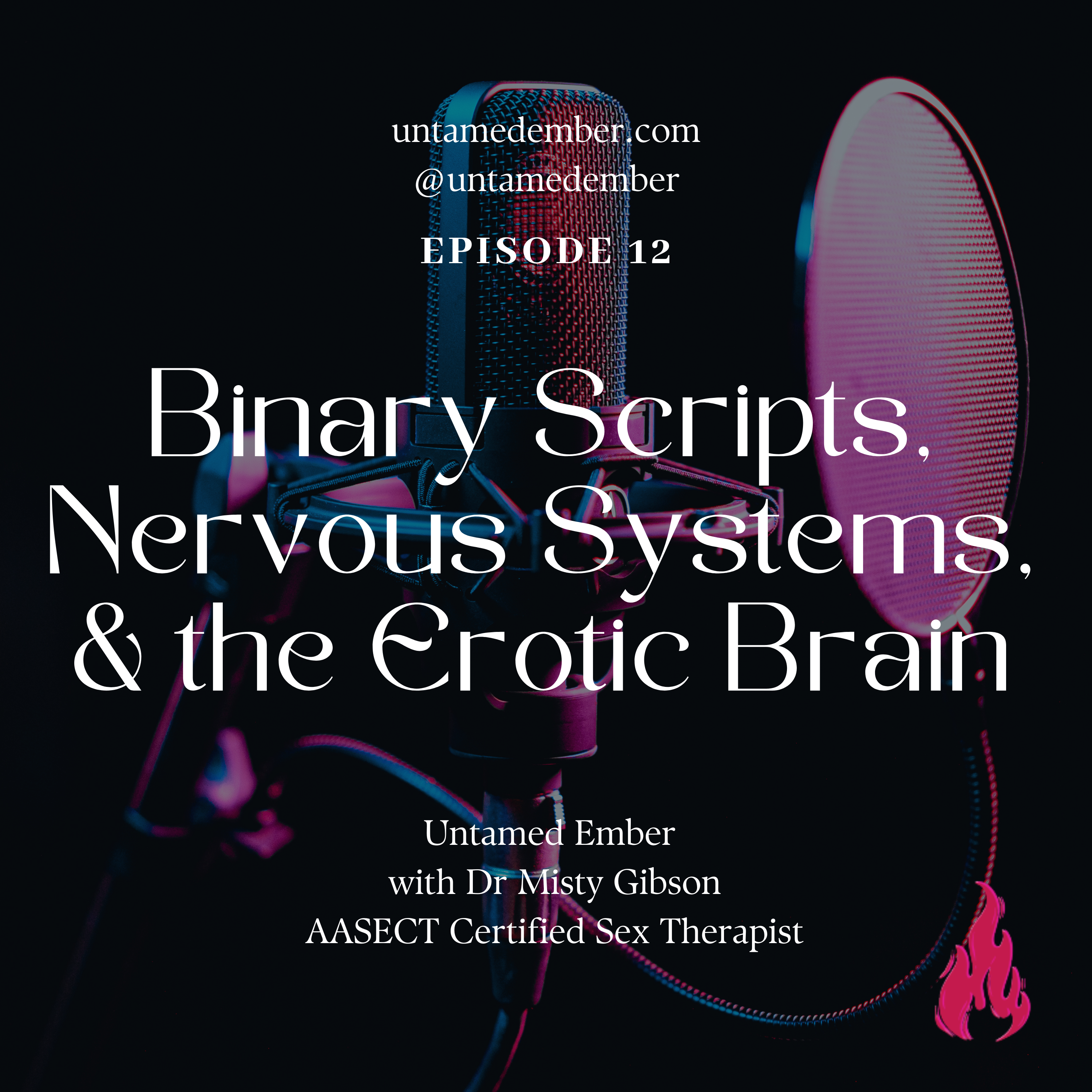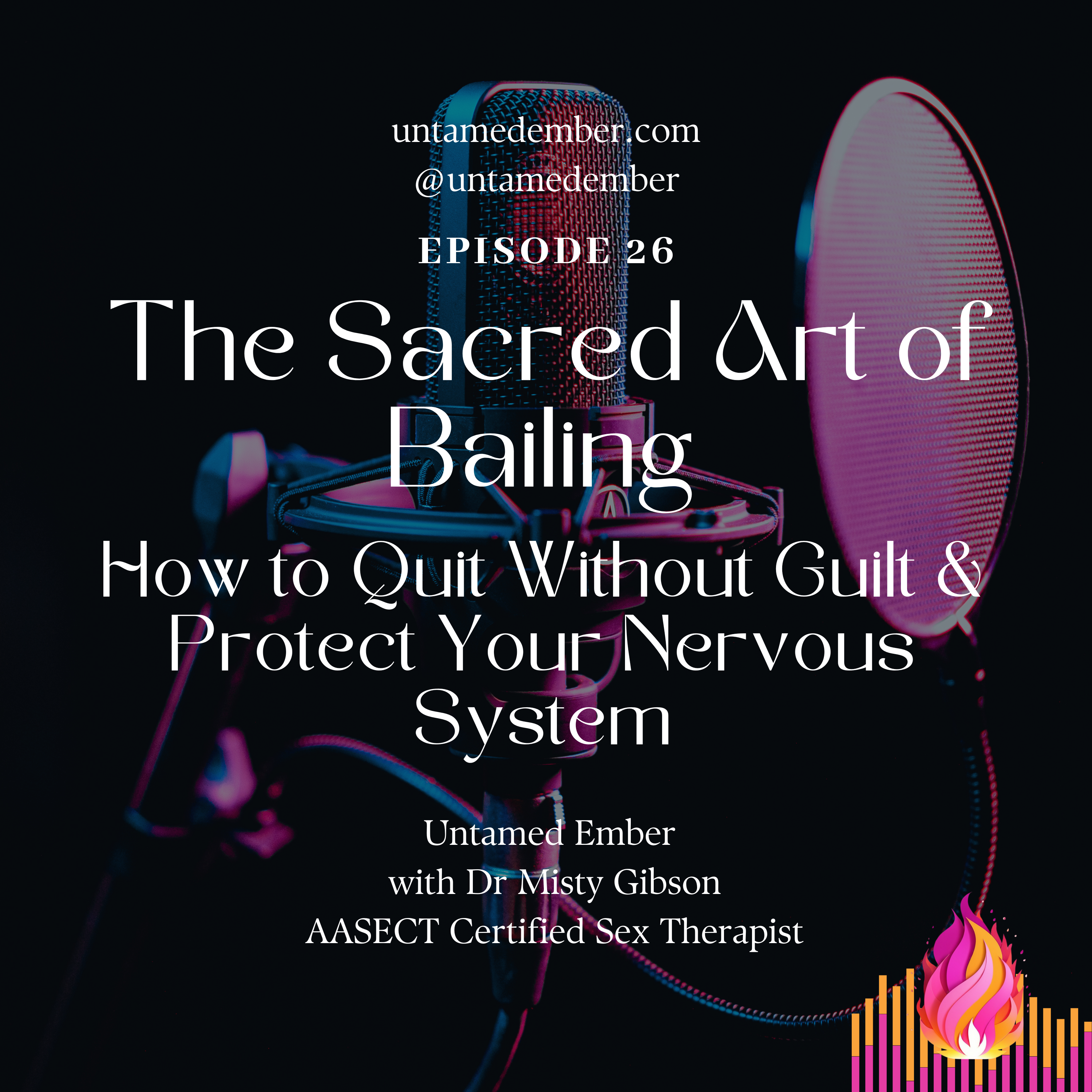Episode Transcript
[00:00:00] So there I was, having what I thought was really connected intimate sex with my partner, feeling all proud of my sexual prowess and emotional attunement skills when they looked up at me afterward and said, sorry, I totally spaced out around minute three. Were you saying something important?
[00:00:17] Excuse me? What?
[00:00:19] Because here's the thing nobody warns you about when you're dating trauma survivors, neurodivergent folks, or basically anyone with a functioning nervous system. In this garbage fire of a world, your partner can be physically present, actively participating, making all the right sounds, and still be approximately as mentally present as a Windows 95 computer trying to run TikTok. I'm talking about that supremely mind fucking moment when you realize the person you've been making love to has actually been watching the whole thing from somewhere near the ceiling. Like they're some kind of sexy ghost who accidentally got separated from their body and is now floating around going, oh, that looks nice for them down there.
[00:01:06] And the most confusing part, they're not faking it. They're not lying to you. They literally went somewhere else entirely while their body stayed behind to fulfill its earthly sexual duties.
[00:01:18] It's like their consciousness just noped out and left their nervous system on autopilot. Maybe you've never noticed because it's subtle. They just seem to be going through the motions, technically present, but somehow not.
[00:01:33] Maybe their eyes look like they're staring through you instead of at you, like you're a window they're looking past rather than a person they're connecting with. Or maybe it's obvious as hell and you just didn't know what you were looking at.
[00:01:46] Maybe they go completely still mid encounter, like someone hit the pause button on their entire existence.
[00:01:53] Maybe they become weirdly compliant, agreeing to everything, but in a way that feels automated rather than enthusiastic.
[00:02:02] If you've experienced this particular brand of sexual plot twist, welcome to the what the fuck just happened club.
[00:02:10] Hey, loves. This is Dr. Misty with Untamed Ember, where we talk about sex, shame, the nervous system, and today, how to love someone whose brain sometimes decides to take an unscheduled vacation during sex.
[00:02:23] Last episode we talked about why nervous systems sometimes can't stay present for sexual pleasure.
[00:02:29] Today we're flipping the script and talking to the partners, the people loving trauma survivors, the folks dating neurodivergent humans, anyone who's ever had the deeply confusing experience of feeling like they're suddenly having sex alone, despite having another person right there with them. Because here's what absolutely nobody teaches you. Recognizing dissociation during sex isn't just about dramatic freeze responses or obvious distress.
[00:02:56] Most of the time, it's subtle as hell, easy to miss, and happens even during enthusiastic consensual encounters.
[00:03:04] And knowing how to respond when you realize your person has vacated the premises. How to create actual safety instead of accidentally making things worse is a skill that nobody talks about but everyone fucking needs.
[00:03:18] Let's start with the detective work. Because recognizing dissociation during sex is like trying to spot a chameleon. It's disappointing, designed to be invisible. Your partner isn't trying to trick you. Their nervous system is just really good at protective camouflage.
[00:03:34] Most of the time, dissociation doesn't look like what you'd expect. There's no dramatic collapse, no obvious distress signals, no flashing neon sign that says consciousness has left the building.
[00:03:47] Instead, it's more like the lights are on but nobody's home. The body is participating, but the person has gone offline.
[00:03:55] First, let's talk about breathing. Because breath is like the nervous system's social media. It tells you everything about what's really going on. When someone dissociates during sex, their breathing often becomes mechanical, like their body forgot it's supposed to be a collaborative process.
[00:04:11] They might start breathing like they're following some kind of sexual instruction manual. Step one, inhale. Step two, exhale. Step three, make appropriate sexual noises.
[00:04:23] Their muscle tone goes weird too. Not relaxed weird. That's good weird. I'm talking about either going rigid like sexual mannequin or going rigid like a sexual mannequin. Or conversely, becoming floppy in a way that doesn't feel like I'm so turned on, I'm melting and more like my consciousness just logged off and left my body on screensaver mode. Eye contact becomes different.
[00:04:50] They might still be looking at you, but it's like looking at someone who's staring through a window at something far away. You know that feeling when you're trying to talk to someone who's clearly reading text over your shoulder? It's like that, but during sex, which is significantly more jarring. And their responses to touch become automatic rather than responsive. Instead of their body dancing with yours reacting to what you're doing, they start going through the motions that feel disconnected from actual sensation.
[00:05:19] It's like they're performing person having sex rather than actually having sex. Beyond the physical signs, there's this energetic shift that's hard to describe but impossible to miss. Once you know what you're looking for, Suddenly you feel like you're having sex alone, even though there's definitely another human right there. With you, that sense of connection, of being in the experience together, it just evaporates.
[00:05:44] One minute you're in this shared intimate bubble, and the next minute you're wondering if your partner has been replaced by a very polite sex robot. Their vocalizations might become either completely absent or weirdly performative.
[00:05:58] Their vocalizations might become either completely absent or somewhat performative.
[00:06:04] They stop making those natural involuntary sounds that happen during genuine arousal. Or they start making sounds that feel like they're auditioning for a role rather than expressing actual pleasure.
[00:06:16] And here's the part that might really fuck with your head. They might become super compliant, agreeing to everything, going along with whatever you suggest, but in this automatic way that starts to feel less like enthusiasm and more like compliance.
[00:06:33] Which is confusing as hell because they're saying yes to everything, but something about their energy is screaming, I'm not actually here to consent to this.
[00:06:43] Here's what makes this whole situation extra challenging. Your partner might have no idea that it's happening. Dissociation is sneaky like that. It's an unconscious protective mechanism that operates below the radar of conscious awareness. You might finish having sex and think something felt off. And when you mention it, your partner is genuinely surprised.
[00:07:08] They might not remember feeling disconnected at all. This isn't gaslighting or lying. Their brain literally filed that experience under handled by autopilot, no conscious participation required.
[00:07:20] This is why trusting your gut as a partner is so crucial.
[00:07:25] If you have that feeling that they weren't really with you, even if they can't confirm it, that intuition is usually spot on.
[00:07:32] Your nervous system is picking up on something their conscious mind missed.
[00:07:37] Now let's talk about all the ways well meaning partners accidentally make dissociation worse. Because good intentions plus lack of information equals some spectacularly unhelpful responses. The biggest mistake is pretending you don't notice and just continuing with whatever sexual activity is happening. I get it. You might think acknowledging it will embarrass them or make them feel broken when. Which we're not saying anyway because that phrase is banned from this house.
[00:08:07] But continuing when someone has dissociated isn't just ineffective. It's like having sex with somebody's body while their actual self is in another time zone. When someone is dissociated, they're not actually consenting to what's happening. They're enduring it.
[00:08:23] Even if they said yes at the beginning. If they're no longer present in their body, continuing doesn't serve anyone. Except maybe your ego.
[00:08:31] Look, it's natural to feel confused or even Rejected when you realize your partner has mentally left the building during sex. But flooding them with your emotional response while their nervous system is already overwhelmed is like adding more weight to someone who's already drowning. Their dissociation isn't a Yelp review of your sexual skills. It's their nervous system doing what it learned to do to protect them.
[00:08:56] Try not to make their protective response about your insecurity, at least not in the moment.
[00:09:01] Avoid immediately demanding explanations. What happened? Why did you disappear? What did I do wrong? When someone is dissociated or just returning from dissociation, they often can't access the cognitive awareness needed to provide a detailed analysis of their experience.
[00:09:19] Asking them to become a narrator for your own trauma response while they're still in it is like asking someone to explain calculus while they're having a panic attack.
[00:09:30] The timing is not optimal.
[00:09:33] Some partners try to forcefully bring someone back from dissociation with intense eye contact, loud voices, or vigorous touch. This treats dissociation like daydreaming. Instead of understanding it as a protective nervous system response. Trying to shock someone back into their body often triggers more defensive responses. It's like honking at someone who's already in a car accident.
[00:09:57] Not helpful and likely to make things worse. If you interpret every instance of dissociation as evidence that your partner doesn't want you, you'll create pressure that actually makes dissociation more likely. Dissociation is often about nervous system patterns that have nothing to do with their feelings about you or your relationship. Making their protective responses about your relationship insecurity. Making their protective responses about your relationship insecurity turns their healing into a performance for your emotional needs, which is counterproductive for everyone involved.
[00:10:34] So what do you do when you realize your partner has temporarily relocated to another dimension while their body stayed behind for sex?
[00:10:43] The goal is creating space for them to return without shame, pressure, or drama.
[00:10:49] The moment you notice dissociation, the most helpful thing you can do is create a gentle pause.
[00:10:56] This doesn't need to be dramatic or alarm inducing. You can slow down, take a deeper breath, maybe shift to less intense contact.
[00:11:05] Try something simple like hey, let's take a breath together for a moment or I want to slow down and check in. The key is creating space without making them feel like they've committed some kind of sexual felony.
[00:11:19] Instead of complex questions that require extensive cognitive processing, try simple yes, no options.
[00:11:26] Do you want to pause, or would it feel good to just breathe for a minute?
[00:11:31] These are easier to process when someone's nervous system is in protection mode. Sometimes gentle physical grounding can help someone begin to return to their body. But this isn't about forcing them back. It's about offering an invitation.
[00:11:46] You might offer your hand for them to squeeze. Giving their nervous system something concrete to focus on.
[00:11:52] Weight and pressure can sometimes help someone feel their physical boundaries again. A firm hug, gentle pressure on their back, your hand on their chest.
[00:12:01] Synchronized breathing can be incredibly helpful. You might place your hand somewhere they can feel it and breathe slowly and deeply, letting your regulated nervous system help guide theirs back online.
[00:12:14] But always ask before offering touch. When someone is dissociated, what feels grounding to one person might feel overwhelming or invasive to another.
[00:12:23] The most important thing you can offer is reassurance that they're safe and there's no pressure to perform, explain, or fix anything. You might say you're safe. We don't need to do anything right now.
[00:12:37] There's no rush. Take whatever time you need.
[00:12:40] I'm here for you. Nothing needs to happen.
[00:12:44] The goal is communicating that they're not in trouble, you're not upset, and their well being matters more than sexual completion.
[00:12:51] Sometimes a gentle pause and shift is enough to help someone return to their body and reconnect with the experience.
[00:12:58] Other times, it's clear that sexual activity should end for now. Signs that stopping is probably best if they remain disconnected after a few minutes, if they seem confused about where they are, if they can't make eye contact or respond to gentle questions, or if you sense that they're trying to force themselves back into presence rather than naturally returning. Signs that adjusting might work if they're able to make eye contact and communicate, if they express wanting to continue but needing something different, or if the pause seems to help them settle back into their body.
[00:13:35] Follow their lead while prioritizing nervous system regulation over sexual goal achievement.
[00:13:41] While knowing how to respond to dissociation in the moment is crucial, the real magic happens in creating the kind of ongoing safety that makes dissociation less necessary as a protective mechanism. One of the most powerful things you can do is develop skills for tracking and supporting your partner's nervous system throughout regular life, not just during sex.
[00:14:05] Learn their patterns.
[00:14:07] When do they tend to get overwhelmed? What are their early warning signs of stress or shutdown?
[00:14:13] How do they naturally regulate? Do they need movement? Quiet physical contact? Space?
[00:14:19] Practice micro attunements throughout the day.
[00:14:23] Notice when they seem stressed and offer support.
[00:14:26] Recognize when they're overwhelmed and suggest that they take space.
[00:14:30] Help them feel seen and supported before overwhelm becomes shut down.
[00:14:35] Create co regulation rituals that have nothing to do with sex.
[00:14:40] Maybe it's synchronized breathing before bed. Maybe it's taking turns giving shoulder rubs while watching Netflix. Maybe it's sitting together in silence.
[00:14:50] These practices help your nervous system learn to regulate together, Creating a Foundation for Sexual Safety Having regular conversations about sexuality, boundaries and nervous system needs during completely non sexual times is essential for creating genuine safety. Ask about their sexual nervous system patterns when you're both calm and not horny. What helps them feel safe during intimacy?
[00:15:17] What are early warning signs that they're getting overwhelmed? What would they want you to do if you notice them dissociating?
[00:15:24] Explore their arousal and comfort patterns together.
[00:15:28] Maybe they need more time to warm up. Maybe certain positions or activities are more likely to trigger overwhelm.
[00:15:36] Maybe they need more verbal check ins or conversely, less talking during intimate moments.
[00:15:42] Discuss aftercare needs specifically. What helps them feel safe and connected after sex? Do they need to be held or do they need space?
[00:15:51] Do they need verbal reassurance or is a quiet presence better? For many trauma survivors and neurodivergent folks, unpredictability itself can trigger dissociation.
[00:16:03] Creating more predictability around sexual intimacy can significantly reduce nervous system activation.
[00:16:11] This might mean having conversations about timing. Are there certain times of day when they feel more available for intimacy? Are there life stressors that make sexual connection feel overwhelming? It might mean discussing, pacing and initiation.
[00:16:26] How do they like sexual encounters to begin?
[00:16:29] Do they need more time to transition from daily life into sexual connection?
[00:16:34] How can you communicate desire without creating pressure? Consider creating explicit agreements about pausing or stopping. Having clear permission to pause or stop sexual activity without it, meaning rejection or relationship failure can actually make it easier for someone to stay present because they know that they have an exit strategy if needed. Let me tell you a story about Jamie and Sarah because their story illustrates how partners can learn to work with dissociation rather than around it. Jamie and Sarah had been together for about a year when Sarah started mentioning feeling spacey during sex. Jamie initially didn't think much of it and everyone zones out sometimes, right? But then Jamie started noticing patterns. Sarah would become very still and quiet during intimate moments, but not in a relaxed way, more like they'd been replaced by a very polite sex Android. Few times Jamie noticed this. They didn't say anything. Sarah wasn't saying stop. They seemed to be participating. So Jamie figured everything was fine. It wasn't until Sarah mentioned feeling like they missed several recent sexual encounters that Jamie realized they'd been having sex with someone who wasn't actually there.
[00:17:54] Jamie felt like absolute shit. They'd been so focused on their own experience that they'd completely missed their partner disappearing. But then they made it worse by becoming hypervigilant, constantly asking, are you okay? Are you here with me? Every 30 seconds. Which turned sex into a performance of presence rather than an experience of connection. The breakthrough came when they started talking about this outside the bedroom.
[00:18:21] Sarah helped Jamie understand what dissociation felt like from the inside. Like watching someone else's life happen, feeling disconnected from their own body and emotions.
[00:18:31] More importantly, Sarah helped Jamie understand that dissociation wasn't always about the sex itself. Sometimes it was triggered by work stress.
[00:18:41] Sometimes it happened when Sarah felt particularly vulnerable or seen.
[00:18:46] Sometimes it was just their nervous system's response to intensity, even wanted intensity. Together, they developed a system.
[00:18:55] Sarah practiced recognizing their early warning signs of dissociation and communicating when they needed to pause or shift. Jamie practiced reading Sarah's energy and body language, learning to distinguish between Sarah's being relaxed and Sarah's being checked out.
[00:19:13] They created a simple signal. Sarah would tap Jamie's arm twice if they were starting to float away so they could communicate what was happening without having to find the words in the moment. They practiced pausing during sex, not as a failure or an interruption, but as normal maintenance for Sarah's nervous system. Jamie also worked on managing their own emotional responses when Sarah dissociated.
[00:19:37] Instead of taking it personally or feeling like they'd failed as a partner, Jamie learned to see it as information about Sarah's nervous system that they could work with together.
[00:19:48] Most importantly, they discovered that the work they did outside the bedroom building nervous system co regulation, creating safety and daily interactions. Having ongoing conversations about needs and boundaries dramatically reduced how often Sarah dissociated during sex.
[00:20:05] This story illustrates something crucial. Supporting a partner through dissociation isn't just about crisis management.
[00:20:13] It's about creating a foundation of safety and attunement that makes dissociation less necessary as a survival strategy. Before we wrap up, let's acknowledge something that doesn't get talked about.
[00:20:26] The emotional impact on partners. When someone they love struggles with dissociation during sex, it's natural to feel confused, hurt, or even rejected when your partner mentally leaves the building during intimate Mom.
[00:20:40] You might wonder if you're terrible at sex, if they're not attracted to you, if your relationship is doomed. These feelings are valid and human.
[00:20:49] It's important to have places to process these emotions that don't make your partner feel responsible for managing your emotional response to their trauma symptoms. This might mean therapy for yourself, trusted friends who can listen without judgment or support groups for partners of trauma survivors.
[00:21:09] Your partner's dissociation affects you and you're allowed to have feelings about it. But those feelings are yours to manage, not theirs to fix. Finding support while respecting your partner's privacy can be tricky. Look for general resources about supporting trauma survivors rather than sharing intimate details about your partner's experiences.
[00:21:29] Many therapists offer sessions focused on helping partners develop skills for supporting someone with trauma history.
[00:21:36] Online communities for partners of trauma survivors can be helpful as long as you focus on your own growth rather than seeking crowdsourced advice about your specific partner's responses. When sexual encounters get interrupted by dissociation, your nervous system likely gets activated too. You might feel anxious, disappointed, or confused.
[00:21:57] Learning to regulate your own emotional responses is crucial for creating the kind of stable presence that that helps your partner feel safe. This might mean developing your own practices for returning to calm after sexual interruptions.
[00:22:11] Maybe it's breathing techniques. Maybe it's physical movement. Maybe it's reminding yourself that pausing sex isn't failure, it's prioritizing well being.
[00:22:21] As we wrap up today's exploration of supporting partners through sexual dissociation, here's what I want you to remember. Learning to love someone whose nervous system sometimes pulls them away from intimacy and isn't about becoming a perfect partner who never triggers any protective responses. It's about developing the skills to create safety together, to respond with compassion when protection is needed, and to celebrate the moments of genuine connection.
[00:22:49] Your partner's dissociation during sex isn't a reflection on your inadequacy or your relationship's failure. It's information about their nervous system that you can learn to work with together.
[00:23:02] When you approach it with curiosity rather than judgment, with patience rather than pressure, you're not just supporting them through difficult moments, you're actively participating in creating new patterns of safety and connection. The goal isn't to eliminate dissociation entirely. The goal is to create enough ongoing safety that it becomes less necessary and enough skill that when it does happen, you you can navigate it together with grace.
[00:23:31] This week I invite you to try one practice of nervous system attunement with your partner outside of sexual contexts. Maybe it's offering different support when you notice they're stressed. Maybe it's starting a conversation about what helps them feel safe.
[00:23:47] Maybe it's simply practicing being present with them without any agenda beyond connection.
[00:23:54] And for embervault members, don't forget to grab this week's worksheet, the Partner's Survival Guide to Sexual Dissociation this resource includes specific language for checking in during intimate moments, conversation starters for discussing nervous system needs and practices for building co regulation skills together.
[00:24:15] You'll find it@untamed ember.com and if you haven't joined our free newsletter yet, head to untamed ember kit.com for free weekly resources delivered right to your inbox. But until then, this is Dr. Misty with Untamed Ember, reminding you that supporting someone through sexual trauma responses isn't about fixing them, it's about loving them exactly as they are, while creating conditions where healing becomes possible.
[00:24:43] See you next episode.




